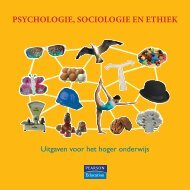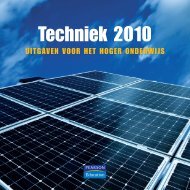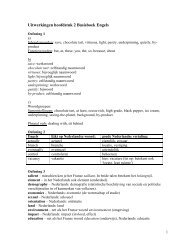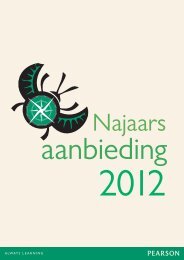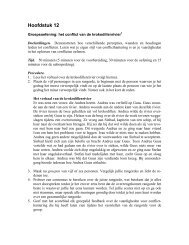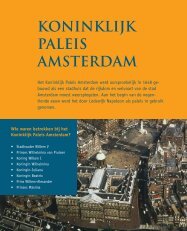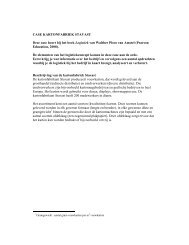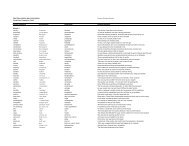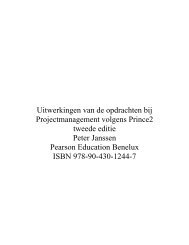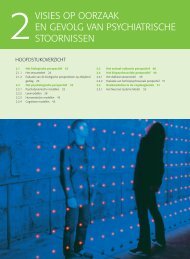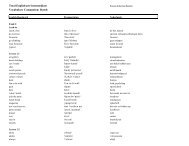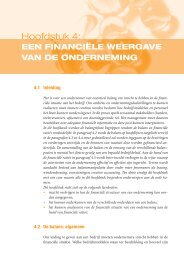Uitwerkingen hoofdstuk 6 - Pearson Education
Uitwerkingen hoofdstuk 6 - Pearson Education
Uitwerkingen hoofdstuk 6 - Pearson Education
Create successful ePaper yourself
Turn your PDF publications into a flip-book with our unique Google optimized e-Paper software.
<strong>Uitwerkingen</strong> <strong>hoofdstuk</strong> 6 Basisboek Engels<br />
Oefening 1<br />
Voorbeelduitwerking tekstplan samenvatting van onderzoek naar invoering Engels hbo<br />
Inleiding:<br />
- Onderzoek uitgevoerd naar vraag of Engels vanaf 2012 voertaal op hbo moet worden.<br />
- Uitgevoerd door [naam opdrachtgever] onder 150 studenten en 50 docenten van<br />
dezelfde hogeschool [naam].<br />
- Eventueel aanleiding voor onderzoek aangeven (als openingszin): vb. Engels<br />
internationale voertaal/handelstaal, gevolgen hiervan voor onderwijs/bedrijfsleven.<br />
Kern:<br />
Per alinea één resultaat bespreken en kort toelichten:<br />
> alinea 1: 50/50 verdeling onder studenten, waarbij studenten van meer economische<br />
opleidingen meer openstaan voor invoering.<br />
> alinea 2: mening van docenten. Weinig animo voor, met uitzondering van docenten<br />
van meer economische opleidingen.<br />
> alinea 3: zowel studenten als docenten stellen duidelijke voorwaarde aan mogelijke<br />
invoering: veel extra aandacht aan Engels taalonderwijs.<br />
Conclusie:<br />
[voorbeeld]<br />
- Meer animo voor invoering onder studenten dan docenten, maar dit is wel afhankelijk<br />
van studierichting.<br />
- Voorstel om verder onderzoek uit te voeren bij meer economisch georiënteerde<br />
opleidingen onder een grotere groep studenten.<br />
- Voorwaarde bij invoering is drastische uitbreiding van het curriculum ten aanzien van<br />
het Engelse taalonderwijs, waarbij buitenlandse stage in Engelstalig land verplicht<br />
gesteld moet worden.<br />
Oefening 2<br />
Voorbeelduitwerking opiniestuk Engels als voertaal op het hbo:<br />
Brainstormsessie<br />
Hoofdvraag:<br />
Wat vind ik ervan? Ben ik voor of tegen?<br />
Kan niet zeggen voor of tegen, is afhankelijk van allerlei factoren!<br />
Ben in bepaalde omstandigheden voor, in bepaalde omstandigheden tegen.<br />
Ook afhankelijk van aanpassingen die gemaakt worden in onderwijs.<br />
Vóór onder voorwaarde dat:<br />
- Nut/noodzaak helemaal afhankelijk van studierichting. Als studie voorbereidt op<br />
internationale werkomgeving (bv. bedrijfsleven/ontwikkelingswerk), dan kan het<br />
gunstige ontwikkeling zijn.<br />
1
- Docenten moeten Engels zelf heel goed beheersen; nu veel gehoorde klacht dat dit<br />
niet geval is.<br />
- Veel meer aandacht aan taalbeheersing: niet alleen colleges in het Engels, ook<br />
colleges óver het Engels (schrijven, presenteren, grammatica, etc).<br />
- Verplichtstelling internationale stage in Engelstalig land van ten minste drie<br />
maanden. Probleem bij taalles nu: weinig toegepast (alleen bij drankje bestellen in<br />
vakantieland).<br />
Tegen, omdat:<br />
Eigenlijk de keerzijde van alle bovenstaande argumenten. Dus:<br />
- Bij sommige studierichtingen niet relevant (Nederlands Taal, Nederlandse<br />
Geschiedenis, Nederlands Recht, etc.)<br />
- Slechte beheersing Engels docenten > steenkolenengels<br />
- Véél meer Engelse les!! Nu veel te weinig!!<br />
Overige overwegingen:<br />
- Eigenlijk eerder beginnen. Voertaal op middelbare school bij Engelse les moet vanaf<br />
dag 1 Engels zijn. Nu alleen op sommige scholen (geldt trouwens ook voor<br />
Duits/Frans).<br />
- Niet vergeten dat Nederlands taal van Nederland is: ook voldoende taalonderwijs in<br />
NL! (ook kunnen schrijven in NL).<br />
- Student moet wel duidelijke keuze hebben!! Moet ook nog onderwijs in NL kunnen<br />
volgen.<br />
Dus: ben wel voor, maar onder bepaalde voorwaarden. Maar dus eigenlijk geen voor of<br />
tegen vraag, maar omstandigheden vaststellen waaronder je het zou moeten willen.<br />
+ Denk na over volgorde waarin ik overwegingen wil presenteren! Is opiniestuk, dus wil<br />
eindigen met meest krachtige argument/reden. Is mijn mening, maar wil lezer er wel mee<br />
beïnvloeden (zelfs overtuigen).<br />
Tekstplan<br />
Inleiding<br />
Opening artikel met algemene zin: Engels internationale voertaal leidt tot vraag of we<br />
Engels ook als voertaal in het Nederlandse onderwijs moeten invoeren.<br />
Hoofdvraag artikel: Hoe sta ik hier tegenover? Geen ja/nee vraag, maar<br />
omstandigheden/situaties blootleggen waarin dit wenselijk zou zijn + welke aanpassingen<br />
moeten er in het onderwijs plaatsvinden.<br />
Kern<br />
Alinea 1: Engels internationale voertaal. Argument op zich. Nederlands is nl. geen<br />
internationale voertaal. Maar: ook voldoende aandacht blijven besteden aan Nederlands.<br />
Eigenlijk dus tweetalig onderwijs.<br />
2
Alinea 2: (voortbouwend op vorige alinea) Beslissing wel afhankelijk van<br />
studierichting (geef vb studierichtingen waar dit wel/niet relevant/nuttig zou zijn).<br />
Alinea 3: Voorwaarden waaronder invoering mogelijk is: aanpassing onderwijs<br />
(taalbeheersing docenten + veel aandacht aan taalbeheersing studenten besteden (incl.<br />
verplichtstelling internationale stage)).<br />
(Als dit een hele lange alinea wordt, meer alinea’s aan wijden en eindigen met wat ik<br />
belangrijkste voorwaarde vind).<br />
Conclusie<br />
Kort hoofdvraag herhalen, kort mijn antwoord erop: goed idee, maar alleen onder<br />
bepaalde voorwaarden.<br />
En: student moet altijd keuze blijven houden, want voertaal van Nederland is wel gewoon<br />
Nederlands.<br />
Oefening 3<br />
De oorspronkelijke tekst is onderverdeeld in de volgende zes alinea’s. De kernzin is<br />
onderstreept in iedere alinea.<br />
The death of yearbooks<br />
A tradition in decline<br />
[1] ONE fixture of college life is rapidly disappearing. Yearbooks, those beloved annual<br />
publications recording the events and people of the academic year, are suffering from<br />
plummeting print-runs, or are even being dropped altogether, in colleges across the<br />
country.<br />
(Feedback: Je zou de eerste zin ook kunnen hebben herkend als kernzin. De tweede sluit<br />
echter aan bij de titel van het artikel en komt daarom in aanmerking voor kernzin-status.<br />
Deze zin beschrijft heel specifiek wát er aan het verdwijnen is: jaarboeken. De eerste zin<br />
kondigt slechts in algemene zin aan dat er een verandering plaatsvindt in college life. ).<br />
[2] The phenomenon is due in part to the price of the hard-bound volumes, typically as<br />
high as $75. For cash-strapped students facing ever-rising tuition and living costs they are<br />
a luxury that many can’t afford. But the main cause is not the cost so much as the<br />
replacement of print with electronic media by and for the Facebook and MySpace<br />
generation. With social networks linking hundreds of friends and offering digital<br />
photographs and videos the traditional yearbook looks like a bit of a dinosaur.<br />
[Feedback: In de oorspronkelijke tekst begint hier een nieuwe alinea. In deze alinea<br />
worden verschillende redenen gegeven voor de teruggang in de traditie van jaarboeken,<br />
waarbij de opkomst van het digitale tijdperk als de hoofdoorzaak wordt geduid. De zin<br />
die de hoofdoorzaak aangeeft, kan dan ook gezien worden als de kernzin van deze alinea.<br />
Vooral ook omdat deze zin zowel de eerste reden herhaalt (‘not so much the cost as…’)<br />
als de hoofdreden (‘replacement of print with electronic media…’). Wellicht dat je in je<br />
3
analyse beide zinnen hebt gemarkeerd als kernzinnen. Dat is geen onlogische analyse,<br />
maar je moet niet vergeten dat de schrijver een onderscheid maakt tussen de redenen,<br />
door er één als hoofdreden aan te merken.]<br />
[3] After more than a hundred years of publication Purdue University, in Indiana, has<br />
published its last yearbook, as has nearby DePauw University. Even where colleges have<br />
tried to adapt to the new media by, for instance, including DVDs summing up the year<br />
along with the print version, yearbooks are attracting few students, readers or editors.<br />
[Feedback: In de originele opmaak van de tekst is ook hier een alineagrens aangebracht.<br />
De motivatie hiervoor is waarschijnlijk dat deze alinea is gewijd aan het geven van twee<br />
voorbeelden van universiteiten die een lange traditie hadden met jaarboeken die nu op<br />
zijn einde loopt. De laatste zin geeft meer algemene informatie, over wat verschillende<br />
universiteiten hebben gedaan, en geeft aan dat jaarboeken gewoon minder lezers hebben.<br />
In deze alinea valt de kernzin samen met de slotzin.]<br />
[4] McKendree University is the oldest college in Illinois. Inside its historic buildings,<br />
some dating back to the 1820s, its 1,500 students use the latest technology. Although the<br />
university still publishes a yearbook, the print-run is a mere 150 copies, only half of<br />
which are bought by students. Being on the staff of the yearbook used to be considered<br />
prestigious: now only eight students show up for the job. The downturn in print<br />
publications has also hit magazines for alumni. These, for instance at McKendree, are<br />
increasingly being replaced by online editions.<br />
[Feedback: Deze alinea zoomt in op de jaarboek-situatie bij één universiteit in het<br />
bijzonder. De alinea beschrijft in detail hoe de traditie is veranderd op deze universiteit.<br />
Deze alinea heeft geen duidelijke kernzin. De eerste twee zinnen kunnen als inleidende<br />
zinnen aangemerkt worden en de derde zin zou als kernzin aangewezen kunnen worden.]<br />
[5] Yearbooks are hanging on in American high schools but the future is unclear. Parents<br />
and students complain about the high prices, and a generation that has never known a<br />
time before the internet is losing interest.<br />
[Feedback: Na ingezoomd te hebben op de situatie bij één universiteit (McKendree<br />
University), heeft de schrijver het weer over de algemene trend die te zien is bij<br />
jaarboeken. Dit verklaart en motiveert ook de alineagrens. In deze alinea bespreekt hij<br />
niet de situatie op universiteiten, maar op high schools, die ook een traditie hebben met<br />
jaarboeken. Hier dient de eerste zin als de kernzin. Deze geeft aan dat het hebben van<br />
jaarboeken nu nog een traditie is op high schools, maar dat de toekomst onzeker is. De<br />
zin die daarop volgt licht toe waaróm de toekomst van jaarboeken onzeker is.]<br />
[6] Although today’s students find yearbooks old-fashioned, they may one day miss their<br />
vanished youth. Long after Facebook and MySpace have become obsolete and the<br />
electrons dispersed to the ether, future alumni might just wish for the permanence of ink<br />
on paper.<br />
4
[Feedback: De motivatie voor deze laatste alineagrens schuilt in het feit dat deze alinea<br />
een andere stijl en toon heeft. Tot nu toe in het artikel werden de feiten en veranderingen<br />
in de traditie vrij objectief beschreven; in deze alinea geeft de schrijver (indirect) zijn<br />
mening. Hij geeft aan dat jaarboeken een mooie manier zijn om een herinnering te<br />
hebben aan je jeugd, eentje die minder vluchtig is dan elektronische media als Facebook<br />
en MySpace. De eerste zin van de alinea dient hier als kernzin, die wordt toegelicht in de<br />
zin die daarop volgt.]<br />
Oefening 4<br />
A.<br />
(1) Exercise has also been shown to play an important role in protecting against some<br />
cancers. (2) For example, the Nurses’ Health Study reported that women who had one or<br />
more hours per day of moderate exercise had a 30 percent lower risk of colon cancer than<br />
women who exercised less. (3) Exercise protects against breast cancer, as well.<br />
(bron: newsweek print edition, June 30 2008, p. 54)<br />
Feedback: In deze alinea is de eerste zin de kernzin. Zin (2) leidt duidelijk een voorbeeld<br />
in, aangegeven door for example. Voorbeeldzinnen volgen vaak op een kernzin om deze<br />
verder toe te lichten. Zin (1) is algemeen geformuleerd: hierin wordt aangegeven dat<br />
exercise (sport) een belangrijke rol kan spelen in het beschermen/voorkomen van<br />
sommige kankersoorten. Zin (3) geeft een specifiek voorbeeld van één kankersoort:<br />
borstkanker. Een openingszin van een alinea begint meestal met meer algemene<br />
informatie en werkt dan naar specifieke informatie toe. Daarom is zin (1) de kernzin.<br />
B.<br />
(1) Humans are programmed with basic survival skills. (2) When frightened, we get a<br />
shot of performance-enhancing hormones, and the blood pumps to our limbs to help us<br />
outrun whatever enemy we face. (3) But in modern times, we’re hardly aware of such<br />
natural skills, and most of us do little to understand or develop them.<br />
(bron: Time print edition, vol. 171, no. 25, 2008, p. 33)<br />
Feedback: Bij het zoeken naar de juiste volgorde van zinnen in deze alinea, kan het<br />
helpen om eerst te proberen de kernzin te vinden. Dit is vaak een algemeen<br />
geformuleerde zin. Van de drie zinnen in deze alinea, komt zin (1) daar het best voor in<br />
aanmerking. Vaak is er dan nog een zin die de kernzin nader toelicht of uitwerkt. Dit is<br />
zin (2): hierin wordt uitgelegd wat er met ‘basic skills’ bedoeld wordt. Zin (3) bevat<br />
eigenlijk nieuwe informatie: hierin wordt aangegeven dat we ons tegenwoordig niet meer<br />
bewust zijn van deze basic skills. De kans is groot dat dit dan weer verder wordt<br />
uitgewerkt in de volgende alinea.<br />
C.<br />
(1) Across the world, people want to save money on food, but shopping habits vary a lot.<br />
(2) In Latin America – where staples such as powdered milk, cooking oil and rice have<br />
risen in price by up to 40% – people say they are now more likely to buy food frequently<br />
and in modest amounts. (3) In both Europe and America, the response is the opposite:<br />
people who drive to hypermarkets in search of the best bargains say they are doing so less<br />
often than before, in part because the cost of filling their tank has gone up.<br />
5
(bron: The Economist, print edition, 21 August 2008, http://www.economist.com/world/international/<br />
displayStory.cfm?source=hptextfeature&story_id=11986140)<br />
Feedback: In het vinden van de juiste volgorde van zinnen, is het weer goed eerst de<br />
kernzin te zoeken. Dit is wederom de meest algemeen geformuleerde zin. Dat is in dit<br />
geval zin (1). De andere twee zinnen lichten nader toe wat er in de kernzin is<br />
aangekondigd, namelijk dat er behoorlijke variatie is in koopgedrag (shopping habits).<br />
Om vervolgens te bepalen welk voorbeeld eerst genoemd moet worden, dat van Latin<br />
America of dat van Europe and America, moet je die zinnen zelf goed lezen. Bij het lezen<br />
van zin (3) wordt duidelijk dat dit tegengesteld wordt aan iets dat eerder is genoemd (the<br />
response is opposite). Dit kan alleen maar vergeleken worden met de situatie in een ander<br />
gebied, namelijk Latin America. Daarom volgt zin (2) de kernzin en is zin (3) de laatste<br />
zin.<br />
Oefening 5<br />
1. Every year hundreds of exchange students come to study in the Netherlands OF<br />
Hundreds of exchange students come to study in the Netherlands every year.<br />
2. House prices will definitely rise over the next few months OF Over the next few<br />
months house prices will definitely rise.<br />
3. Students typically get their degree before the age of 25.<br />
4. As of this week the school’s website is only accessible to authorised users.<br />
5. During exam periods students typically drink at least seven cups of coffee a day OF<br />
Students typically drink at least seven cups of coffee a day during exam periods.<br />
6. Most people probably go the dentist once a year.<br />
7. A large number of people typically watch at least eight hours of TV a week.<br />
8. In the Netherlands trains are hardly ever exactly on time OF Trains are hardly ever<br />
exactly on time in the Netherlands.<br />
Oefening 6<br />
Modeluitwerking<br />
1. Tijd: [After you have read all the questions thoroughly], [you can answer them one<br />
by one].<br />
[Before you answer the questions one by one], [you first have to read them<br />
thoroughly].<br />
2. Voorwaarde: [If students want to feel fitter and less tired], [they have to eat healthy<br />
and sleep well].<br />
3. Tegenstelling: [Although one in twenty students drops out of college], [the majority<br />
(of students) finish their degree].<br />
[Whereas the majority of students finish their degree], [one in twenty (does) drops<br />
out of college].<br />
4. Verklaring/reden: [Because/as/since feelings of depression can come on gradually],<br />
[we may not feel just how depressed we are].<br />
5. Tijd: [Before you write a text], [you make an outline of the text].<br />
[After you have made an outline of the text], [you can write the text itself].<br />
6. Tegenstelling: [Although/even though/whereas it may not always seem like parents<br />
can influence the way their children think about political issues], [many children<br />
adopt their parents’ view on societal issues].<br />
6
Oefening 7<br />
Modeluitwerking<br />
[In the Netherlands you first go to primary school] and [then you go to secondary<br />
school]. [In secondary school you can choose to follow three different types of level]:<br />
[one level lasts four years]; [another level lasts five years]; and [yet another level lasts<br />
six years]. [Each of these levels prepares you for a particular type of school or university<br />
that you can go to after secondary school]. [Let’s take an example]. [Damian finished the<br />
second level in secondary school that lasts five years]. [If he wants to go to university],<br />
[he can get there in two ways]. [He can go to a so-called applied college]; [(he can) finish<br />
this], and [(he can) then go to university]. [If he only finishes the first year of the applied<br />
college], [he can also go to university]. [Although both ways are possible], [most<br />
students choose to first finish college and then go to university]. [This means that they<br />
will spend many years in school]. [Because this is very expensive for the government], [it<br />
wants to change the system].<br />
Oefening 8<br />
1. Uitbreidend: James Norton, who is the CEO of an international company, was<br />
accused of fraud.<br />
2. Uitbreidend: A major hurricane, which went by the name of Katrina, hit New Orleans<br />
in 2006.<br />
3. Beperkend: I will send you the slides that/which you need for the presentation as soon<br />
as possible.<br />
4. Uitbreidend: The power outage at the White House, which lasted two hours, is now<br />
fixed.<br />
5. Beperkend: The student who cheated on his exam last year was expelled from<br />
university.<br />
6. Beperkend: Last night I met my old college professor who(m) I had not seen for<br />
years.<br />
Oefening 9<br />
I'll admit it. I'm fascinated by Vista, principally because I don't have to use it. In that I'm<br />
very similar to lots of people in all sorts of companies; and perhaps many home users. I<br />
enjoy watching the car crash of Microsoft's repeated efforts to tell people Vista is great<br />
even as it fights off class action lawsuits about its selling practices and prepares a<br />
replacement (Windows 7).<br />
But I was particularly struck by a phrase of Dave Winer (RSS pioneer). Vista, he said,<br />
has "the smell of death".<br />
…<br />
He's certainly right that operating systems can be failures. Microsoft has had its fair<br />
share: Windows Me was the most recent, and does anyone remember trying Windows<br />
1.0, Windows 2.0, or Windows 3.0? I did use Windows 2.0 on a laptop with an 80286<br />
chip once. It was an exercise in patience; I got a lot of coffee made. As for Windows Me,<br />
it was the Microsoft Bob of operating systems.<br />
(bron: http://www.guardian.co.uk/technology/2008/aug/29/windows.vista)<br />
7
Oefening 10<br />
1. It is a region where people of different ethnicity, culture and religion have lived<br />
together in peace for centuries.<br />
were = verleden tijd van to be (zijn)<br />
piece = stukje, deel<br />
four = vier<br />
2. When he gave me directions, I couldn’t hear him. I think he told us to first go right<br />
and then left.<br />
here = hier<br />
write = het werkwoord schrijven<br />
than = dit wordt gebruikt bij een vergrotende trap (taller than you)<br />
3. I have to buy a new coat. The weather is changing and it’s becoming cooler.<br />
by = voorzetsel<br />
whether = she asked me whether I needed any help.<br />
its = bezittelijk (the cat is licked its paws) vs. it is (it’s)<br />
4. In hospitals doctors hardly ever spend a whole hour with their patients.<br />
hole = gat<br />
our = van ons (bezittelijk)<br />
patience = geduld<br />
5. In order to cope with everyday problems, overseas students are advised to stay in<br />
touch with their family and friends on a regular basis.<br />
every day = iedere dag vs. everyday = dagelijks/alledaags<br />
oversees = het werkwoord to oversee (overzien)<br />
advice = zelfstandig naamwoord, advise = werkwoord<br />
they’re = they are<br />
6. If you want to get registered, you have to provide your personal details, such as<br />
nationality, date of birth and address.<br />
you’re = you are<br />
personnel = personeel<br />
Oefening 11<br />
“Back in the early 1990s (tijdsbepalend), email was a privilege granted only to those<br />
who could prove they needed it. Now (tijdsbepalend), it has turned into a nuisance that's<br />
costing companies millions. We may feel that we have it under control, but<br />
(tegenstellend) not only do we check email more often than we realise, but<br />
(tegenstellend) the interruptions caused are more detrimental than was previously<br />
thought. In a study last year (plaatsbepalend), Dr Thomas Jackson of Loughborough<br />
University found that it takes an average of 64 seconds to recover your train of thought<br />
after interruption by email. So (verklarend) people who check their email every five<br />
minutes waste 8.5 hours a week figuring out what they were doing moments before.<br />
It had been assumed that email doesn't cause interruptions because (verklarend) the<br />
recipient chooses when to check for and respond to email. But (tegenstellend) Jackson<br />
found that people tend to respond to email as it arrives, taking an average of only one<br />
minute and 44 seconds to act upon a new email notification; 70% of alerts got a reaction<br />
within six seconds. That's faster than letting the phone ring three times.”<br />
(bron: http://www.guardian.co.uk/technology/2008/aug/28/email.addiction)<br />
8
Oefening 12<br />
1. However: For reasons doctors still don't understand, younger women are much more<br />
likely to have thyroid disorders (schildklierproblemen) than men. However, as men<br />
get older, they are more prone to thyroid problems.<br />
(bron: http://www.newsweek.com/id/148401)<br />
2. Therefore: It is evident that obesity (vetzucht) stems from a combination of lack of<br />
nutritional education in families and communities, lack of physical exercise, the<br />
media, and government inactivity. The solution is therefore anything but simple.”<br />
(bron: http://student.bmj.com/issues/06/01/life/38.php)<br />
3. In other words: It's deeply troubling that in 2007 just 8.5 percent of students used<br />
their college's counseling services. In other words, students were more likely to<br />
consider killing themselves than to seek help.<br />
(bron: http://www.newsweek.com/id/154361, aangepast)<br />
4. For example: “There is one way in which a girl will never be equal to a boy, and that<br />
is the way her body processes alcohol. For example, if two people, of opposite<br />
genders, but equal weight, drink the same amount and type of alcohol, the woman<br />
will get drunker and stay that way longer.<br />
(bron: http://www.newsweek.com/id/151303, aangepast)<br />
5. However: ‘If body fat increases, the insulin in the body just isn't strong enough to<br />
work against the fat, and the person gets diabetes.’ That explanation, however,<br />
doesn't work for everyone, because it fails to account for the 20 percent of type 2<br />
diabetes patients who aren't overweight.<br />
(bron: http://www.newsweek.com/id/155357, aangepast)<br />
Oefening 13<br />
a)<br />
1. Woordvolgorde: Over the past few months house prices have dropped considerably.<br />
2. Meervoud na a (large) number of én volgorde tijd- en plaatsbepaling (eerst plaats,<br />
dan tijd): A large number of people watch television every night.<br />
3. Volgorde tijd- plaatsbepaling: Maria has lived in Paris for three years.<br />
4. Plaats bijwoord in de zin én spelling spend (spend-spent-spent, dus tegenwoordige<br />
tijd/hele werkwoord met een d, verleden tijd met een t): It is probably very expensive<br />
to spend three nights in a hotel in New York.<br />
5. Meervoud na 55% of the students: Around 55% of the students in Dutch universities<br />
are female.<br />
6. Interpunctie: de zin die vooraf gaat aan de dubbele punt moet grammaticaal compleet<br />
zijn. Mogelijke oplossingen: This means that people should sell their houses before<br />
house prices drop. OF People should act as follows: sell their houses before house<br />
prices drop.<br />
7. Verschil beperkende/uitbreidende bijzinnen. Hier gaat het om een beperkende bijzin:<br />
de dokter die een fout heeft gemaakt, die wordt aangeklaagd. De bijzin geeft hier<br />
geen extra informatie over de dokter, maar het identificeert hem. Ook is malpractice<br />
verkeerd gespeld (moet zijn: practice i.p.v. practise): The doctor who made an<br />
enormous mistake during surgery was sued for malpractice.<br />
9
8. Enkelvoud/meervoud: het werkwoord in de bijzin moet meervoud zijn (na number).<br />
Ook is decree verkeerd gespeld. Het moet zijn: degree. Daarnaast zijn er twee<br />
interpunctiefouten in deze zin: er staat een komma na het onderwerp (the number of<br />
students who finish their degrees) én is er een comma splice in deze zin (twee<br />
hoofdzinnen die slechts door een komma verbonden worden. Mogelijke oplossingen:<br />
The number of students who finish their degrees has dropped by at least 10%, which<br />
is a significant increase when compared to last year. /The number of students who<br />
finish their degrees has dropped by at least 10%; this is a significant increase when<br />
compared to last year.<br />
b)<br />
Het verband tussen beide zinnen is er een van contrast (een tegenstelling). Je kunt de<br />
zinnen bijvoorbeeld verbinden met het voegwoord even though of although: Lucía passed<br />
her final exams, even though she spent very little time preparing for them./ Even<br />
though/although she spent very little time preparing for them, Lucía passed her final<br />
exams,.<br />
c)<br />
Juiste volgorde zinnen: (1) Mandela understood that blacks and Afrikaners had<br />
something fundamental in common: Afrikaners believed themselves to be Africans as<br />
deeply as blacks did. (2) He knew, too, that Afrikaners had been the victims of prejudice<br />
themselves: the British government and the white English settlers looked down on them.<br />
(3) Afrikaners suffered from a cultural inferiority complex almost as much as blacks did.<br />
Toelichting: De zin voor de dubbele punt in (1) geeft aan wat het onderwerp van deze<br />
alinea is: de overeenkomst tussen blacks en Afrikaners in Zuid Afrika, zoals<br />
waargenomen door Mandela. Dit wordt nader gespecificeerd in de zin die volgt op deze<br />
dubbele punt en in zin (2). Dat (2) op (1) moet volgen is duidelijk door het<br />
verbindingswoord too (ook). Deze zin beschrijft welke overeenkomst hij nog meer<br />
waarnam. Zin (3) tot slot vat samen hoe de Afrikaners zich voelden. Dit is heel duidelijk<br />
een concluding sentence.<br />
(bron: Time print edition, 21 July 2008, p. 27)<br />
Case 1<br />
Cannabis may shrink brain<br />
Ian Sample<br />
The Guardian, Tuesday June 3 2008<br />
Smoking cannabis for long periods of time may shrink parts of the brain that govern<br />
memory, emotion and aggression, according to researchers in Australia. Scientists used<br />
magnetic resonance imaging to scan the brains of people who admitted to smoking more<br />
than five joints a day for at least 10 years and compared them with brain images taken<br />
from non-drug users.<br />
Those who smoked cannabis regularly had on average a 12% smaller hippocampus, the<br />
part of the brain which is thought to be involved with emotion and memory, and a 7%<br />
smaller amygdala, which plays a role in regulating fear and aggression.<br />
10
For the study, researchers imaged the brains of 15 cannabis smokers and 16 individuals<br />
who did not use the drug. The scientists, led by Murat Yücel at the University of<br />
Melbourne and colleagues at the University of Wollongong, said scans on larger numbers<br />
of people were needed to confirm the extent of the effect.<br />
"Although modest use may not lead to significant neurotoxic effects, these results suggest<br />
that heavy daily use might indeed be toxic to human brain tissue," the scientists report in<br />
the journal Archives of General Psychiatry.<br />
Cannabis users also fared worse in tests of verbal memory and were more likely to have<br />
low-level symptoms of psychotic disorders such as schizophrenia and mania.<br />
Last month, a team at New York University scanned the brains of a group of 17- to 30-<br />
year-olds who had smoked cannabis two to three times a week for at least a year. In that<br />
study, the brains of drug users looked no different from those who had never taken<br />
cannabis.<br />
In 2004, Cyril D'Souza, a professor of psychiatry at Yale University, reported that THC,<br />
the active ingredient in cannabis, caused fleeting schizophrenia-like symptoms in users,<br />
ranging from suspiciousness and delusions to poor memory and attention span.<br />
(bron: http://www.guardian.co.uk/science/2008/jun/03/drugs.drugsandalcohol)<br />
Case 2<br />
Voorbeelduitwerking van brainstormsessie en tekstplan (eerst in het Nederlands, daarna<br />
in het Engels)<br />
Brainstormsessie<br />
Waarom is dit een issue? Waar zouden mensen last van kunnen hebben als er gebeld<br />
wordt in openbare ruimtes?<br />
- geluidsoverlast (in stille ruimtes)<br />
- deelgenoot gemaakt worden van privé-gesprekken (bv. in trein/bus/restaurants)<br />
- respectloos (bv. tijdens colleges, als andere mensen aan het woord zijn, bij het<br />
afrekenen in de winkel, maar ook tijdens film/uitvoering)<br />
- gestoord worden in concentratie (bv. als je aan het werk bent)<br />
Wat vind ik? Hoort bij het leven nu; is niet meer weg te denken en hoeft ook niet meer<br />
weggedacht te worden, maar zijn wel richtlijnen nodig.<br />
Mogelijke richtlijnen:<br />
- bij geluidsoverlast: niet bellen in zogenaamde ‘stilte ruimtes’ – deze dienen<br />
aangegeven te worden met een label of sticker.<br />
- deelgenoot gemaakt worden van privé-gesprekken: tenzij aangegeven dat er ergens<br />
helemaal niet mag worden gebeld, stemvolume zo laag mogelijk houden.<br />
- in bepaalde ruimtes of situaties zou per definitie niet gebeld mogen worden, uit<br />
respect: collegezalen, ziekenhuizen, bij de kassa)<br />
11
- andere ruimte opzoeken als je iemand stoort in zijn concentratie.<br />
Tekstplan<br />
Inleiding:<br />
Bijvoorbeeld openen met algemene zin: mobiele telefoons zijn niet meer weg te denken.<br />
Over het gebruik ervan in openbare ruimtes bestaat de nodige ophef. Oplossing: heldere<br />
richtlijnen opstellen.<br />
Kern:<br />
In alinea’s: bespreek richtlijnen. Werk één richtlijn uit per alinea.<br />
Alinea 1: sommige ruimtes moeten duidelijk gemarkeerd worden als ‘stilteruimtes’. Dit<br />
moet gebeuren d.m.v. een sticker of een label. Voorbeelden ruimtes: ziekenhuizen,<br />
restaurants, openbaar vervoer.<br />
Alinea 2: ander type richtlijnen zijn eigelijk onafhankelijk van ruimte, maar hebben meer<br />
te maken met ‘goed fatsoen’. Zoals: deelgenoot privé-gesprekken, bellen tijdens college,<br />
afrekenen, etc, iemand anders afleiden en storen in concentratie.<br />
Conclusie:<br />
Voor gebruik van mobiele telefoon in openbare ruimtes moeten heldere richtlijnen<br />
geformuleerd worden. Sommige hiervan zijn duidelijk te formuleren, anderen grenzen<br />
meer aan ‘goed gedrag regels’ of goed fatsoen. Het kan lastig zijn deze te benoemen en<br />
expliciet te maken; hoopt ook dat mensen dit aanvoelen.<br />
English:<br />
Brainstorm<br />
Mobile phone use (British English)/ cell phone use (American English) in public places:<br />
source of irritation? Why?<br />
- people talking too loudly on the phone;<br />
- overhearing personal conversations (in public transportation or restaurants);<br />
- people forgetting to turn off phones during public performances/lectures/meetings;<br />
- people disturbing you in your concentration, for example while working or studying.<br />
What do I think? Part of life, but we need guidelines or norms. Possible norms:<br />
- no use of mobile phones in intimate public settings, such as restaurants, buses, trains<br />
(put the ringer on vibrate or silent mode).<br />
- phones should be turned off in movie theatres, lecture rooms, hospitals, etc.<br />
- do not involve others in personal conversations; keep public conversations brief and<br />
keep your voice low;<br />
- if you have to take a certain call, step outside or to a secluded area, try to maintain a<br />
distance of at least a few metres when talking on your phone.<br />
12
Outline<br />
Norms of cell phone use in public / establishing cell phone etiquette<br />
Introduction:<br />
Opening sentence: mobile phones part of everyday life. People get annoyed about the use<br />
of mobile phones in public places. We therefore need guidelines of common courtesy<br />
when using a mobile phone in public.<br />
Body:<br />
Present guidelines in paragraphs. One guideline per paragraph.<br />
Paragraph 1: use of mobile phones in certain public places should be presented as rules<br />
instead of guidelines. These rules should be indicated clearly, for example by means of<br />
signs. Example: phones should be turned off in intimate public places, such as<br />
restaurants, movie theatres and hospitals.<br />
Paragraph 2: certain guidelines have to do with common courtesy and can therefore not<br />
be laid down as rules. Examples: not making others a part of private conversations, using<br />
obnoxious ring tones, speaking loudly on the phone, etc.<br />
Conclusion:<br />
Clear guidelines should be set for use of mobile phones in public places. Certain<br />
guidelines can be formulated as rules; others have to do with common courtesy and are<br />
therefore more difficult to identify/lay down as rules.<br />
13



